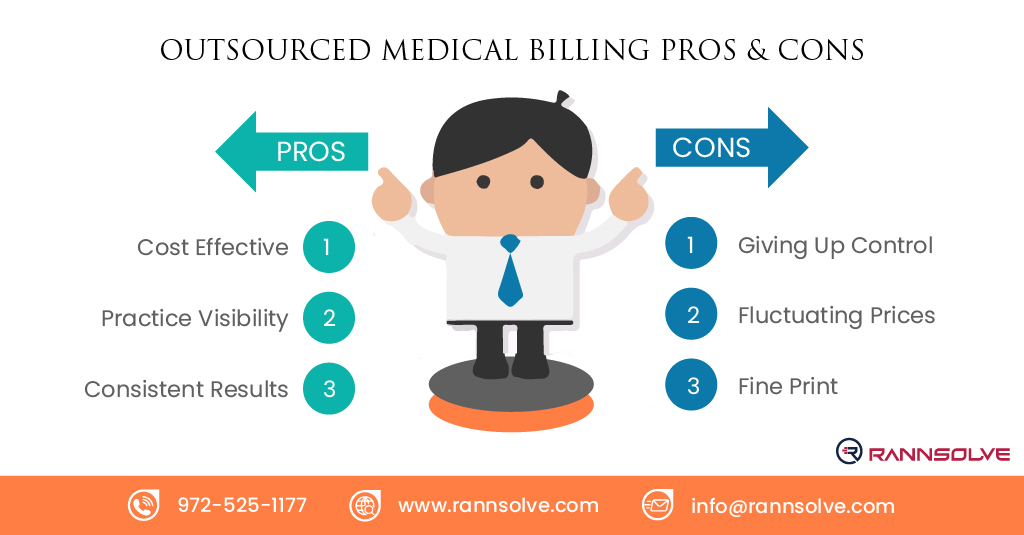In the ever-evolving landscape of healthcare administration, the question of whether medical billing can be outsourced has become a topic of great interest and speculation. As the demands of both patients and healthcare providers increase, the need for efficient, accurate, and cost-effective billing processes has never been more crucial. This article explores the possibility of outsourcing medical billing and delves into the potential benefits and challenges involved in this practice.
Benefits of Outsourcing Medical Billing
Cost savings
Outsourcing medical billing can lead to significant cost savings for healthcare organizations. By outsourcing this task, you can avoid the need to hire and train additional staff, invest in costly billing software and technology, and maintain office space for billing operations. Instead, you can rely on the expertise of a specialized third-party provider who can perform these tasks at a fraction of the cost.
Efficiency
Outsourcing medical billing allows healthcare providers to streamline their operations and improve overall efficiency. Experienced billing professionals utilize efficient processes and technologies to handle billing tasks promptly and accurately. By outsourcing, you can ensure that claims are submitted in a timely manner, reducing the risk of denials or delayed payments. This increased efficiency can also enhance patient satisfaction by minimizing billing errors and resolving issues quickly.
Expertise and accuracy
Medical billing is a complex and ever-changing process that requires in-depth knowledge of medical codes, insurance regulations, and industry guidelines. Outsourcing medical billing ensures that your organization benefits from the expertise of professionals who are well-versed in these areas. These experts stay up-to-date with the latest billing regulations and ensure accurate coding and submission of claims. By entrusting your billing to professionals, you can minimize errors and improve revenue cycle management.
Challenges of Outsourcing Medical Billing

Data security concerns
One of the primary concerns when outsourcing medical billing is the security of patient data. Healthcare providers must comply with strict regulations, such as the Health Insurance Portability and Accountability Act (HIPAA), to safeguard patient information. When choosing an outsourcing partner, it is crucial to ensure that they have robust data security measures in place. This includes secure data transmission and storage, restricted access to sensitive information, and regular audits to ensure compliance.
Lack of control
Outsourcing medical billing means relinquishing some control over the billing process. Since the task is being handled by an external provider, you may have less visibility and immediate control over the processes and outcomes. However, reputable outsourcing partners will provide regular reports and updates to keep you informed. It is essential to establish clear communication channels and expectations to maintain a level of control and transparency throughout the outsourcing relationship.
Communication and language barriers
Communication is vital in any business relationship, and outsourcing medical billing poses unique challenges due to potential language barriers and cultural differences. If your outsourcing partner operates in a different country or region, there may be variations in language proficiency and understanding of medical terminology. It is crucial to address these potential barriers upfront and ensure effective communication channels are established to overcome any potential misunderstandings or delays in communication.
Considerations Before Outsourcing Medical Billing

Assessing financial impact
Before deciding to outsource medical billing, it is essential to assess the financial impact on your organization. Conduct a comprehensive cost-benefit analysis to determine if outsourcing will result in overall cost savings. Consider factors such as labor costs, training expenses, software and technology investments, and potential revenue losses due to billing errors or inefficiencies. This assessment will help you make an informed decision based on the financial implications.
Evaluating internal capabilities
Evaluate your organization’s internal capabilities in medical billing and revenue cycle management. Determine whether your existing staff has the necessary expertise, experience, and bandwidth to handle billing tasks effectively. Assess the efficiency and accuracy of your current processes and systems. This evaluation will help identify any gaps or limitations that outsourcing can address, ensuring improved billing performance and revenue generation.
Choosing the right outsourcing partner
Selecting the right outsourcing partner is critical to the success of your medical billing operations. Consider factors such as the provider’s experience and reputation in the industry, their understanding of medical billing regulations, and their technological capabilities. It is essential to conduct a thorough due diligence process, including checking references, reviewing case studies, and understanding their approach to data security and compliance. Choose a partner that aligns with your organization’s values, goals, and requirements.
How to Select an Outsourcing Partner

Experience and reputation
When selecting an outsourcing partner for medical billing, it is crucial to consider their experience and reputation in the industry. Look for providers who have a proven track record of successfully handling medical billing for similar organizations. They should be well-established and have a solid reputation for delivering high-quality services. Consider partnering with providers who have been in business for several years and can demonstrate their expertise through client testimonials, case studies, and industry recognition.
Understanding of medical billing regulations
Medical billing is a complex field that is subject to numerous regulations and guidelines. It is essential to choose an outsourcing partner who has a deep understanding of these regulations and stays up-to-date with any changes or updates. They should have expertise in medical coding, insurance claims, and compliance requirements. By selecting a partner with a strong knowledge base in medical billing regulations, you can minimize the risk of billing errors, denials, and compliance issues.
Technological capabilities
Technology plays a crucial role in efficient and accurate medical billing. When evaluating outsourcing partners, consider their technological capabilities and infrastructure. They should have robust billing software and systems that can handle large volumes of claims and process payments efficiently. Additionally, look for partners who leverage advanced technologies, such as artificial intelligence and automation, to improve billing processes and increase accuracy. A technologically advanced partner can offer innovative solutions and streamline your revenue cycle management.
Successful Implementation of Outsourced Medical Billing

Thorough transition planning
The successful implementation of outsourced medical billing requires thorough transition planning. Establish a clear timeline and set realistic expectations for the transition process. Create a detailed plan that outlines the tasks and responsibilities of both your organization and the outsourcing partner. Assign a dedicated team to oversee the transition and ensure smooth coordination between internal staff and the outsourcing team. A well-planned transition will help minimize disruptions and ensure a seamless transfer of billing operations.
Effective communication and collaboration
Effective communication and collaboration are essential for the success of outsourced medical billing. Establish regular communication channels and schedule meetings or check-ins as needed. Foster an open and transparent working relationship, where both parties can freely discuss any challenges, concerns, or updates. Encourage collaboration between your internal staff and the outsourcing team to leverage their respective expertise and ensure alignment on common goals and objectives.
Continuous monitoring and evaluation
Once outsourced medical billing is implemented, it is crucial to continuously monitor and evaluate the performance of the outsourcing partner. Establish key performance indicators (KPIs) to track the success and efficiency of the billing process. Regularly review reports and metrics provided by the outsourcing provider to assess their performance. Address any issues or concerns promptly and work collaboratively to find solutions. Continuous monitoring and evaluation will help identify areas for improvement and ensure ongoing success.
Key Factors to Ensure Effective Outsourcing

Establishing clear expectations
To ensure effective outsourcing of medical billing, it is crucial to establish clear expectations from the outset. Clearly define the scope of work, specific deliverables, timelines, and quality standards. The outsourcing partner should have a thorough understanding of your organization’s goals and expectations. Document these expectations in a formal agreement or contract to provide a reference point for both parties. Regularly revisit and revise the expectations as needed to ensure continued alignment.
Regular performance tracking
Regular performance tracking is essential to ensure that the outsourcing partner meets or exceeds the agreed-upon standards. Establish a system for monitoring and evaluating the provider’s performance, such as regular reports or dashboards. Track key performance indicators, such as turnaround time, accuracy, denial rates, and revenue collection. Regularly review these metrics and discuss the results with the outsourcing partner. Address any performance issues promptly and provide constructive feedback to drive continuous improvement.
Maintaining open lines of communication
Open and effective communication is crucial for the success of outsourced medical billing. Establish clear communication channels and protocols, such as scheduled meetings, regular updates, and a point of contact for addressing questions or concerns. Encourage both parties to provide feedback and share insights for process improvements. Regularly communicate any changes or updates that may impact the billing process and maintain transparency throughout the relationship. Strong communication fosters trust and collaboration, leading to a successful outsourcing partnership.
The Future of Outsourced Medical Billing

Technological advancements
The future of outsourced medical billing is closely tied to technological advancements. As technology continues to evolve, outsourcing partners can leverage innovative solutions to streamline billing processes further. Advancements such as automated coding and billing software, intelligent claim scrubbing, and predictive analytics will enhance efficiency and accuracy in medical billing. Outsourcing partners that stay at the forefront of technological advancements can offer cutting-edge solutions that optimize revenue cycle management.
Artificial intelligence in medical billing
Artificial intelligence (AI) has the potential to revolutionize medical billing. AI-powered systems can automate repetitive tasks, such as coding and claim submission, reducing the risk of human error and improving efficiency. Machine learning algorithms can analyze large volumes of data to identify patterns and trends, enabling more accurate and timely claims processing. As AI technology continues to mature, outsourcing partners can integrate AI solutions into their workflows to enhance the speed and accuracy of medical billing operations.
Increasing demand for outsourcing
The demand for outsourcing medical billing is expected to increase in the coming years. Healthcare organizations are realizing the benefits of outsourcing to specialized providers who can offer cost-effective and efficient solutions. The complexity of medical billing, coupled with changing regulations and technological advancements, makes it challenging for organizations to manage billing operations in-house. Outsourcing allows them to focus on core healthcare services while leveraging the expertise and resources of external partners. As the demand for outsourcing grows, providers will need to adapt and expand their offerings to meet the evolving needs of healthcare organizations.
Comparison: In-house vs. Outsourced Medical Billing

Cost considerations
When comparing in-house and outsourced medical billing, cost is a significant consideration. In-house billing requires significant investments in staff, training, software, and infrastructure. Outsourcing can often be more cost-effective as providers benefit from economies of scale and specialized expertise. Furthermore, outsourcing allows organizations to convert fixed costs into variable costs, paying only for the services they need. Conduct a cost analysis to determine which option provides the most financial advantages for your organization.
Efficiency and productivity
Outsourcing medical billing can lead to improved efficiency and productivity compared to in-house billing. Specialized billing providers have streamlined processes and advanced technologies that enable faster and more accurate claims processing. They also have dedicated teams of experts who can focus solely on billing tasks, resulting in increased productivity. In-house billing may be more prone to errors, delays, and inefficiencies, especially if staff members have other responsibilities that divert their attention from billing tasks.
Expertise and compliance
One of the key advantages of outsourcing medical billing is gaining access to specialized expertise and ensuring compliance with regulations. Billing professionals in outsourcing companies undergo extensive training and stay updated with the latest regulations and coding requirements. They have a deep understanding of insurance claims and reimbursement processes, reducing the risk of errors and denials. In-house billing staff may have a broader range of responsibilities, making it challenging to maintain the same level of expertise and compliance.
Outsourcing Medical Billing Internationally

Advantages of offshore outsourcing
Offshore outsourcing of medical billing can offer several advantages. One significant advantage is cost savings. Offshore providers may operate in countries with lower labor costs, allowing organizations to benefit from reduced billing expenses. Additionally, international outsourcing can provide access to a larger talent pool of billing professionals with diverse skill sets and expertise. Some offshore providers may also offer extended operating hours, allowing for round-the-clock billing support.
Cultural differences and sensitivities
While offshore outsourcing can offer advantages, cultural differences and sensitivities need to be considered. Different cultures may have varying business practices, communication styles, and attitudes toward sensitive patient information. It is essential to address these differences and ensure effective communication and understanding between your organization and the outsourcing partner. Establishing cultural sensitivity training and clear protocols for handling sensitive data can help mitigate potential challenges.
Selecting offshore partners
When selecting offshore partners for medical billing outsourcing, it is crucial to conduct thorough due diligence. Verify the provider’s reputation, experience, and expertise in serving clients in your region. Consider factors such as language proficiency, time zone compatibility, and data security measures. It is advisable to visit the offshore facility or conduct virtual site visits to assess their infrastructure, processes, and compliance with regulations. Choosing a reliable and reputable offshore partner is key to a successful outsourcing relationship.
Steps to Transition to Outsourced Medical Billing

Mapping existing billing processes
Before transitioning to outsourced medical billing, it is essential to map your organization’s existing billing processes. This includes identifying and documenting all the tasks, workflows, and systems involved in your current billing operations. Mapping these processes helps ensure a smooth transition by providing a clear understanding of the current state and identifying areas that can be improved or optimized. It also serves as a reference point for the outsourcing partner to understand your unique requirements and tailor their services accordingly.
Training and educating staff
As you transition to outsourced medical billing, it is crucial to train and educate your staff on the changes and expectations. Ensure that your internal team understands the new roles and responsibilities and how they will interact with the outsourcing partner. Provide training on any new processes or technologies that will be implemented. Educate your staff on the benefits of outsourcing and address any concerns or misconceptions they may have. Effective training and education will help facilitate a smooth transition and ensure collaboration between internal and external teams.
Gradual transition and support
To minimize disruptions and ensure a successful transition, consider implementing a gradual transition from in-house to outsourced medical billing. This approach allows for a controlled shift of responsibilities and provides support to both internal and external teams during the transition period. Gradually increase the outsourcing partner’s involvement while maintaining a support team within your organization to address any challenges or questions that arise. This phased approach helps build confidence and trust in the outsourcing partnership and ensures a seamless transition for all stakeholders involved.
